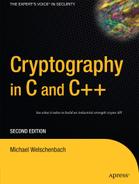| −1 | division by zero |
| −2 | overflow |
| −3 | underflow |
| −4 | memory allocation error |
| −5 | register not available |
| −6 | invalid base in |
| −7 | even modulus in Montgomery reduction |
| −8 | null pointer passed as argument |
| 1 |
|
| 2 |
|
| −1 |
|
|
| base B = 216 of the |
|
| B − 1 |
|
| B2 − 1 |
|
| [B/2] |
|
| standard number of registers in register bank |
|
| number of binary digits per |
|
| logarithm of |
|
| maximal number of digits to base B of a |
|
|
|
|
| number of allocated bytes for a |
|
| maximal number of binary digits of a |
|
| pointer to |
| higher version number of the FLINT/C library | |
| lower version number of the FLINT/C library | |
| ((FLINT_VERMAJ << 8) + FLINT_VERMIN) | version number of the FLINT/C library |
|
| identifier ' |
SETDIGITS_L((a_l), (MIN(DIGITS_L(a_l), (USHORT)CLINTMAXDIGIT)); RMLDZRS_L((a_l)) | reduction modulo (Nmax + 1) | |
ASSIGN_L
(a_l, b_l) |
| assignment |
conversion of a | ||
| generation of a random number of type | |
|
| generation of a random number of type |
clint2str_l
(n_l, base)
CLINT2STR_L
(n_l, base) |
| representation of a |
| reduce number of digits by 1 | |
| conversion of a | |
|
| read number of digits of |
| printf("%s%s
%u bit
",
(S), HEXSTR_L(A), ld_l(A)) | standard output of a |
|
| comparison |
| comparison | |
| comparison | |
| comparison | |
| comparison | |
| conversion of a | |
| increase number of digits by 1 | |
| seed64_l((unsigned long) time(NULL) | initialization of random number generator |
| seedBBS_l((unsigned long) time(NULL)) | initialization of the random bit generator |
(DIGITS_L(n_l) == 0 || (DIGITS_L(n_l) > 0 && (*(LSDPTR_L(n_l)) & 1U) == 0)) | test whether | |
(DIGITS_L(n_l) > 0 && (*(LSDPTR_L(n_l)) & 1U) == 1) | test whether | |
| primality test with fixed parameters | |
| comparison | |
| (((ULONG) SwitchRandAES_l((S)) << 24) | ((ULONG) SwitchRandAES_l((S)) << 16)|((ULONG) SwitchRandAES_l((S)) << 8) |((ULONG) SwitchRandAES_l((S))) | generate a random number of type |
| (((ULONG) SwitchRandRMDSHA1_l((S)) << 24) | ((ULONG) SwitchRandRMDSHA1_l((S)) << 16)|((ULONG) SwitchRandRMDSHA1_l((S)) << 8) |((ULONG) SwitchRandRMDSHA1_l((S))) | generate a random number of type |
| pointer to least-significant digit of a | |
| comparison | |
(GT_L((a_l), (b_l)) ? (a_l) : (b_l) | maximum of two | |
MEXP_L (a_l, e_l,
p_l, n_l | mexp5_l((a_l), (e_l),
(p_l), (n_l))
mexpkm_l((a_l), (e_l),
(p_l), (n_l))
mexp5m_l((a_l), (e_l),
(p_l), (n_l)) | exponentiation, alternative |
MEXP_L (a_l, e_l,
p_l, n_l) | mexpk_l((a_l), (e_l), (p_l), (n_l)) | exponentiation |
(LT_L((a_l), (b_l)) ? (a_l) : (b_l)) | minimum of two | |
| pointer to most-significant digit of a | |
| conversion of a | |
while((DIGITS_L(n_l) >
0)&& (*MSDPTR_L(n_l) == 0))
{DECDIGITS_L(n_l);} | remove leading zeros from a | |
| assignment | |
SETDIGITS_L
(n_l, l) |
| set number of digits |
|
| set |
|
| set |
| set | |
| (((USHORT) SwitchRandAES_l((S)) << 8) | (USHORT) SwitchRandAES_l((S))) | generate a random number of type |
| (((USHORT) sRandRMDSHA1_l((S)) << 8) | (USHORT) sRandRMDSHA1_l((S))) | generate a random number of type |
|
| exchange |
(xor_l((a_l),(b_l),(a_l)), xor_l((b_l),(a_l),(b_l)), xor_l((a_l),(b_l),(a_l))) | exchange two | |
| delete a |
